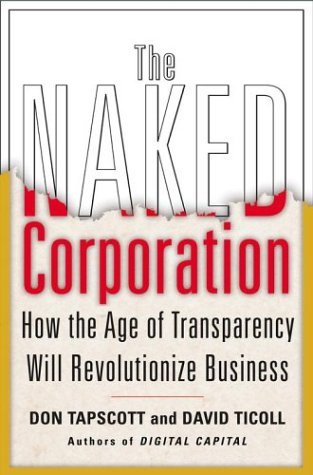
In March 2007 I read an article in Wired magazine titled The See -Through CEO. It introduced me to the concept of radical transparency. Ever since then, I have seen transparency as a business value that should be able to provide significant competitive advantages in this digital world. Wired obviously thinks along similar lines. Quite recently, for example, they wrote about how transparency could have prevented and might solve some of the problems that we are encountering in our financial systems: Road Map for Financial Recovery: Radical Transparency Now!
A couple of weeks ago I decided to try and find some books that might explore these concepts further. To my surprise I couldn’t really find much. The most interesting book that I could find was The Naked Corporation: How the Age of Transparency Will Revolutionize Business. Tapscott and Ticoll’s wrote this book in 2003. They tried to create a conceptual framework for transparency in the corporate world. In the book they build a rationale for companies to embrace transparency as the basis for a couple of new business integrity values.
To build trusting relationships and succeed in a transparent economy, growing numbers of firms in all parts of the globe now behave more responsibly than ever. Disgraced firms represent the old model – a dying breed. Business integrity is on the rise, not just for legal or purely ethical reasons but because it makes economic sense. Firms that exhibit ethical values, openness, and candor have discovered that they can better compete and profit. […] Today’s winners increasingly undress for success.
[…]
Today’s economy depends on knowledge, human intelligence, agility and relationships inside and outside the firm. The fuel is information, and the lubricant is trust. The revolution in information and communication technologies is at the heart of these changes. The Internet and other technologies enable thinking, communication, and collaboration like never before.
They define transparency as the accessibility of information to stakeholders of institutions, regarding matters that affect their interests. The book is chock full of examples of how companies can be successful by being open and transparent. It will help you attract the best employees for example, or can take inefficiencies out of the supply chain preventing overstocking. My employer, Shell, is mentioned in complimentary terms many times in this book (I didn’t realise this when I bought the book…):
Shell’s brand has always stood for reliability […] and consideration […]. Today, Shell places integrity at the center of its brand. Shell is now asking consumers to trust it not only to provide good gas but also to steward the environment and be socially responsible. It positions itself as an honest, transparent corporate citizen. Some critics allege that this is pure window dressing and that Shell’s commitment to advertising how well it behaves is greater than its commitment to behaving well. But there is no comparison between the genuine shift in thinking and behavior at Shell and the thinking at other companies such as Exxon that have just begun to make the turn.
(Look here for a slightly more neutral point of view on Shell’s corporate responsibility. Also check Shell’s values, especially the General Business Principles are an inspiring read.)
The book could have used some heavy editing (honestly: typos??), but still the authors manage to build a convincing case for more transparency and integrity in the corporate world. In short form: a firm should always try to do the decent thing. Doing the decent thing is not always easy and means you have to weigh options and make choices. Only by being clear about why certain choices are made can a company win the trust of all stakeholders: employees, business partners, customers, communities and shareholders/owners.
So back to the title of this post: Why Isn’t There a Wealth of Business Transparency Literature? I think this thinking is still ahead of the curve. Tapscott seems to have a talent for catching on very early (he wrote The Digital Economy in 1996, Growing Up Digital in 1998 and Who Knows: Safeguarding Your Privacy in a Networked World in 1996). When will we get a clear discourse on this topic? I predict it won’t take much longer: expect to hear more!
I would be very happy with any good reading tips on this topic in the comments.
Some transparency from my side: If you click the link to the book you will be taken to The Book Depository. If you then decide to buy something there, I will receive a 5% commission through their affiliate programme.
The Book Depository is a great online book store that has free shipping worldwide and a giant selection (bigger than Amazon as it will allow you to buy Amazon’s collection through its site). Try it…
3 thoughts on “Why Isn’t There a Wealth of Business Transparency Literature?”
Comments are closed.